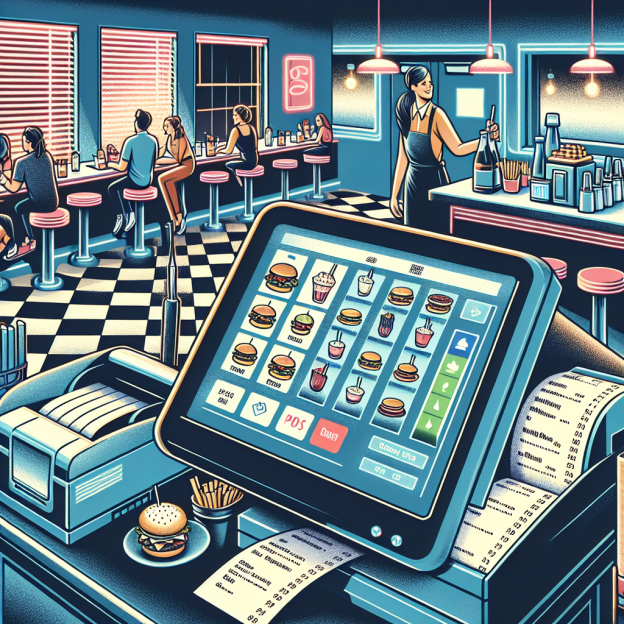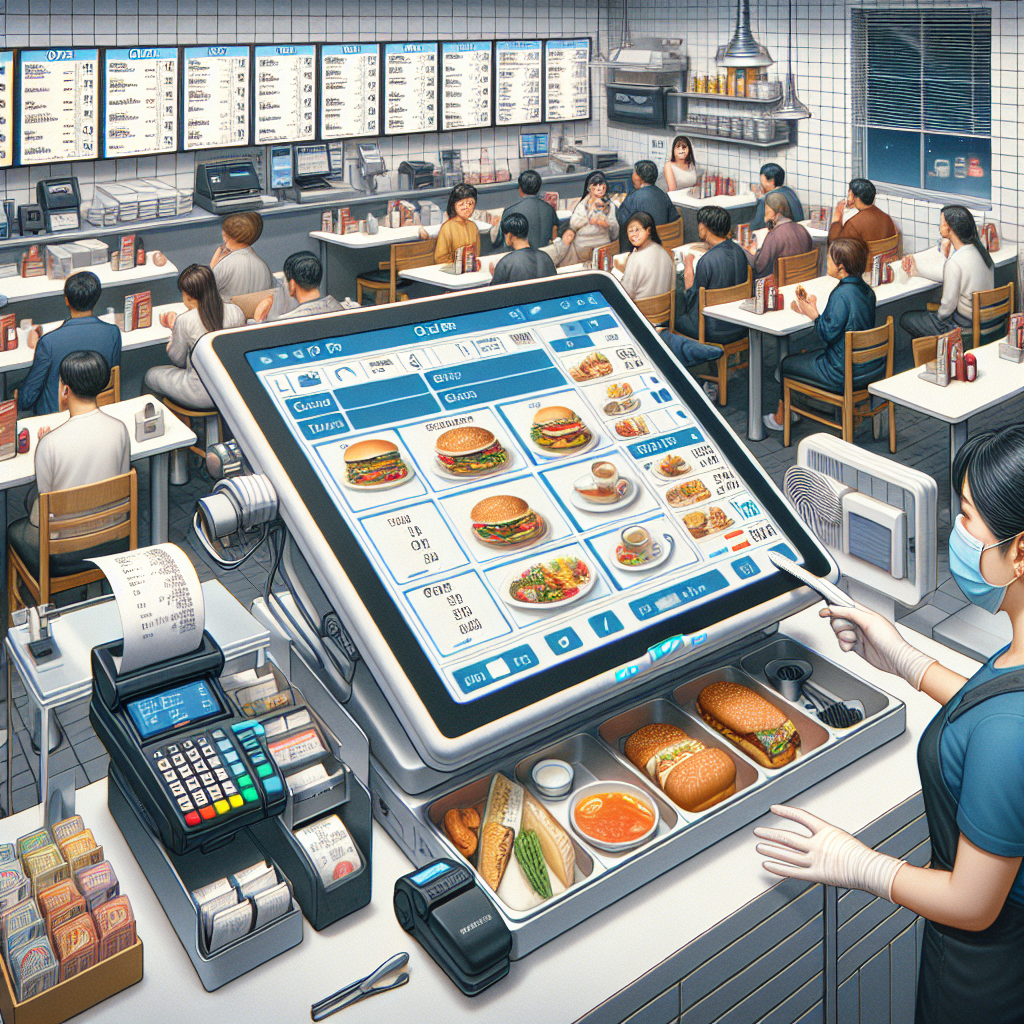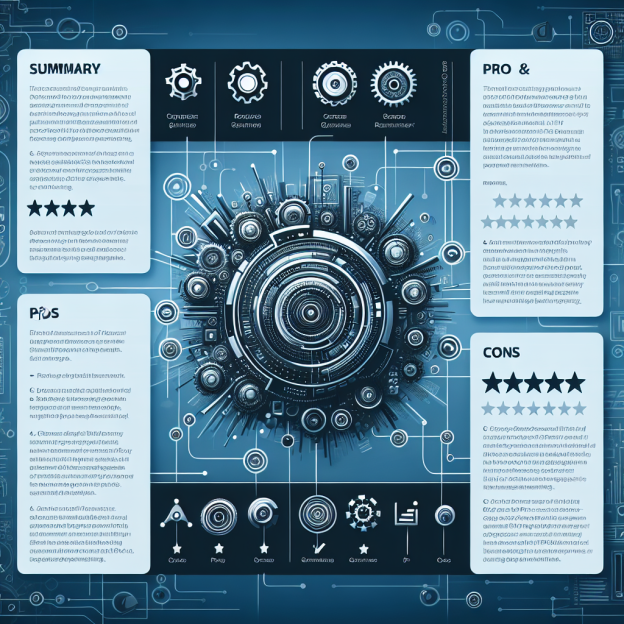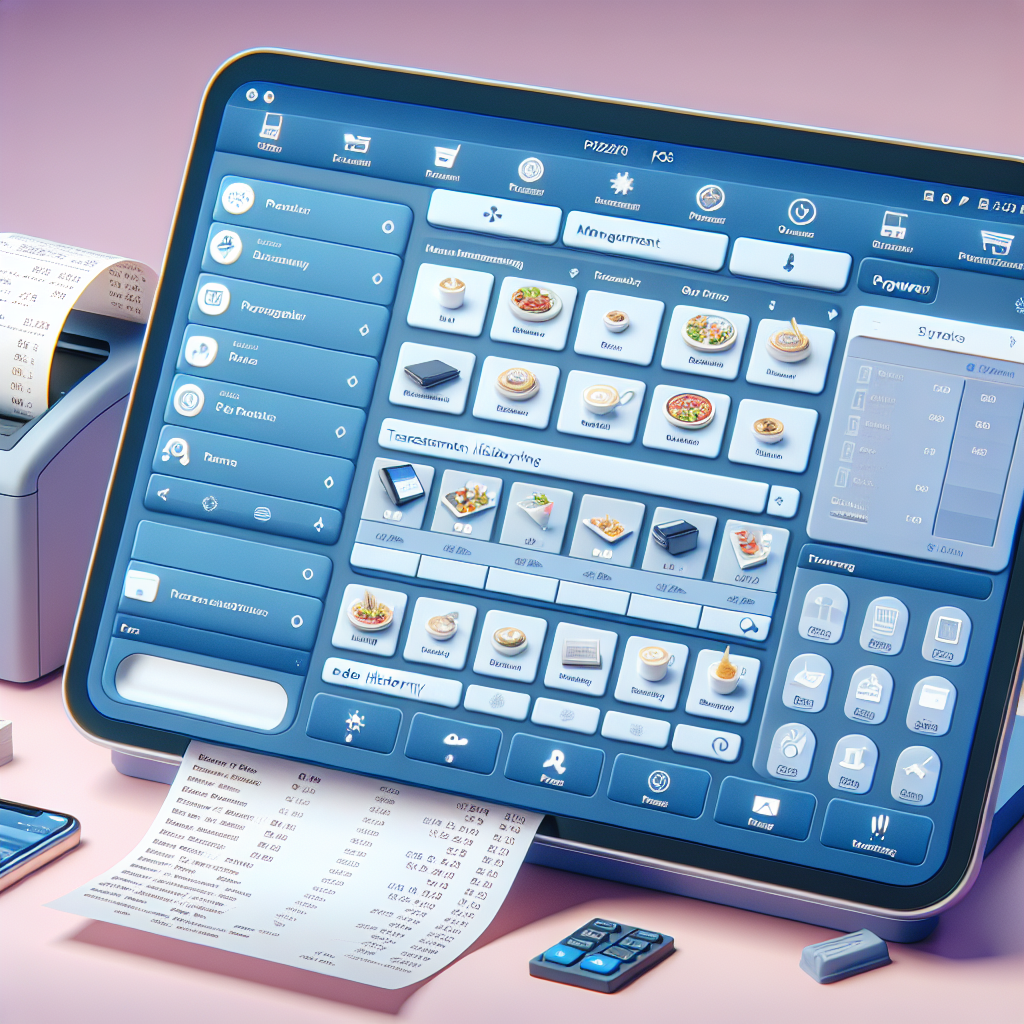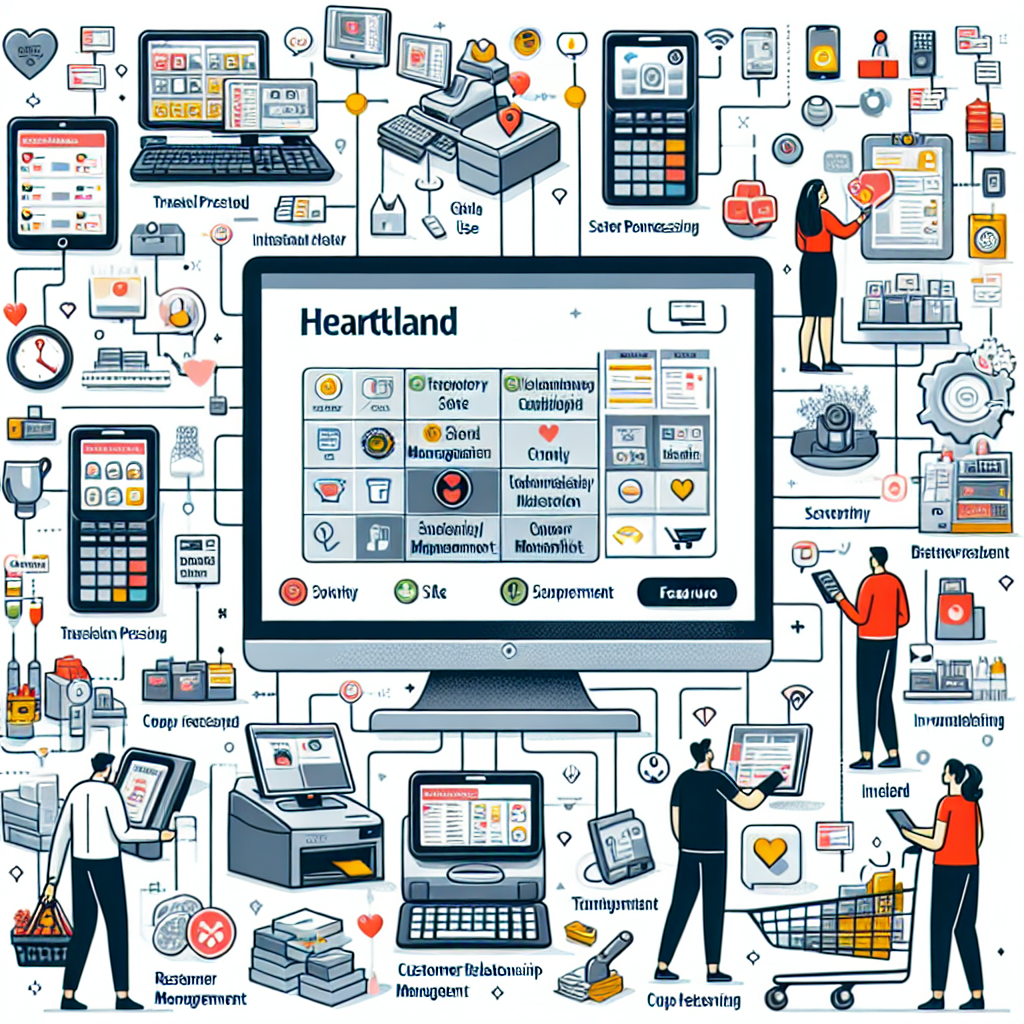Qu POS is a modern point-of-sale system designed to streamline operations for restaurants and food service businesses. Known for its robust and flexible platform, Qu POS offers a comprehensive suite of features that cater to the unique needs of the hospitality industry. It provides seamless integration with various third-party applications, enabling businesses to manage orders, inventory, and customer relationships efficiently. With its user-friendly interface and real-time analytics, Qu POS empowers restaurant owners and managers to make data-driven decisions, enhance customer experiences, and optimize overall operational efficiency.
Comprehensive Overview Of Qu POS Features
Qu POS, a point-of-sale system designed to streamline business operations, offers a comprehensive suite of features that cater to various industries, including retail, hospitality, and service sectors. This system is engineered to enhance efficiency, improve customer experience, and provide robust data analytics, making it a valuable tool for businesses seeking to optimize their operations. To begin with, Qu POS is renowned for its user-friendly interface, which simplifies the transaction process for both employees and customers. The intuitive design ensures that staff can quickly learn to navigate the system, reducing training time and minimizing errors during transactions. This ease of use is particularly beneficial in fast-paced environments where time is of the essence.
Moreover, Qu POS offers extensive customization options, allowing businesses to tailor the system to their specific needs. Whether it is modifying the layout of the interface or integrating third-party applications, the flexibility of Qu POS ensures that it can adapt to the unique requirements of any business. This adaptability is further enhanced by its cloud-based infrastructure, which provides seamless updates and ensures that the system remains current with the latest technological advancements. In addition to its customizable interface, Qu POS excels in inventory management. The system provides real-time tracking of stock levels, enabling businesses to maintain optimal inventory and reduce the risk of overstocking or stockouts. This feature is particularly advantageous for retail businesses, where inventory management is crucial to maintaining profitability.
Furthermore, Qu POS includes a comprehensive reporting and analytics module that offers valuable insights into business performance. By analyzing sales data, customer behavior, and employee performance, businesses can make informed decisions to drive growth and improve operational efficiency. The ability to generate detailed reports on demand allows managers to identify trends and address potential issues proactively. Another notable feature of Qu POS is its robust customer relationship management (CRM) capabilities. The system enables businesses to collect and store customer data, facilitating personalized marketing efforts and enhancing customer loyalty. By understanding customer preferences and purchasing habits, businesses can tailor their offerings to meet the needs of their clientele, ultimately boosting customer satisfaction and retention.
Additionally, Qu POS supports a wide range of payment options, including credit and debit cards, mobile payments, and contactless transactions. This versatility ensures that businesses can accommodate the diverse payment preferences of their customers, thereby enhancing the overall shopping experience. The system’s secure payment processing also provides peace of mind for both businesses and customers, as it adheres to the highest standards of data protection and fraud prevention. Moreover, Qu POS is equipped with employee management features that streamline scheduling, time tracking, and performance monitoring. By automating these tasks, businesses can reduce administrative burdens and focus on more strategic initiatives. The system’s ability to track employee performance also enables managers to identify top performers and address any areas of concern.
In conclusion, Qu POS offers a comprehensive suite of features that cater to the diverse needs of businesses across various industries. Its user-friendly interface, extensive customization options, and robust data analytics make it an invaluable tool for optimizing operations and enhancing customer experience. By providing real-time inventory management, CRM capabilities, and versatile payment options, Qu POS empowers businesses to stay competitive in an ever-evolving market. As such, it is a worthy investment for any business seeking to streamline operations and drive growth.
User Experience: Navigating Qu POS
Navigating the Qu POS system offers a unique user experience that combines intuitive design with robust functionality, making it a compelling choice for businesses seeking efficient point-of-sale solutions. At the heart of Qu POS is its user-friendly interface, which is designed to streamline operations and enhance productivity. The system’s layout is clean and organized, allowing users to easily access various features without unnecessary complexity. This simplicity is particularly beneficial for new users who may not be familiar with advanced POS systems, as it reduces the learning curve and enables quick adaptation.
Moreover, the Qu POS system is equipped with a touch-screen interface that is both responsive and easy to navigate. This feature is crucial in fast-paced environments where time is of the essence, such as in retail or hospitality settings. The touch-screen functionality allows for swift transactions, minimizing wait times for customers and improving overall service efficiency. Additionally, the system’s customizable dashboard enables users to tailor the interface to their specific needs, ensuring that frequently used functions are readily accessible. This level of customization not only enhances user satisfaction but also contributes to a more streamlined workflow.
Transitioning to the system’s operational capabilities, Qu POS offers seamless integration with various third-party applications, which is a significant advantage for businesses that rely on multiple software solutions. This integration capability ensures that data flows smoothly between systems, reducing the risk of errors and enhancing data accuracy. Furthermore, the system supports a wide range of payment options, including credit cards, mobile payments, and contactless transactions, catering to the diverse preferences of modern consumers. This versatility in payment processing is essential for businesses aiming to provide a comprehensive and convenient customer experience.
In addition to its operational strengths, Qu POS excels in its reporting and analytics features. The system provides detailed insights into sales performance, inventory levels, and customer behavior, empowering businesses to make informed decisions. These analytics are presented in an easy-to-understand format, allowing users to quickly interpret data and identify trends. By leveraging these insights, businesses can optimize their operations, improve inventory management, and enhance customer engagement strategies.
Security is another critical aspect where Qu POS demonstrates its reliability. The system employs advanced encryption protocols to protect sensitive data, ensuring that both business and customer information remains secure. This commitment to security is vital in an era where data breaches are a growing concern, providing peace of mind to users and fostering trust with customers.
Furthermore, Qu POS offers robust customer support, which is an invaluable resource for users who may encounter challenges or require assistance. The support team is readily available to address inquiries and provide guidance, ensuring that any issues are resolved promptly. This level of support is particularly beneficial for businesses that operate outside of standard business hours, as it ensures continuity of service and minimizes potential disruptions.
In conclusion, the Qu POS system delivers a comprehensive user experience that combines ease of use with powerful functionality. Its intuitive interface, seamless integration capabilities, and robust security measures make it an ideal choice for businesses seeking a reliable and efficient point-of-sale solution. By prioritizing user experience and operational efficiency, Qu POS stands out as a valuable tool for businesses aiming to enhance their service offerings and drive growth.
Qu POS Vs. Competitors: A Comparative Analysis

In the rapidly evolving landscape of point-of-sale (POS) systems, businesses are constantly seeking solutions that not only meet their operational needs but also provide a competitive edge. Qu POS has emerged as a noteworthy contender in this arena, offering a suite of features designed to streamline operations and enhance customer experiences. However, to truly understand its value, it is essential to compare Qu POS with its competitors, examining the nuances that set it apart and the areas where it may fall short.
To begin with, Qu POS distinguishes itself through its robust cloud-based infrastructure, which ensures seamless integration and real-time data access across multiple locations. This feature is particularly advantageous for businesses with multiple outlets, as it allows for centralized management and consistent updates. In contrast, some competitors still rely on legacy systems that may not offer the same level of connectivity and flexibility. This can lead to inefficiencies and data discrepancies, particularly in larger operations.
Moreover, Qu POS excels in its user-friendly interface, which is designed to minimize the learning curve for new users. This is a critical consideration for businesses that experience high staff turnover or seasonal fluctuations in staffing. By simplifying the onboarding process, Qu POS enables businesses to maintain productivity and reduce training costs. While some competitors also prioritize ease of use, Qu POS’s intuitive design and customizable dashboard provide a level of personalization that is not always matched by other systems.
In addition to its operational capabilities, Qu POS offers a comprehensive suite of analytics tools that empower businesses to make data-driven decisions. These tools provide insights into sales trends, customer preferences, and inventory management, allowing businesses to optimize their strategies and improve profitability. While many competitors offer similar analytics features, Qu POS’s ability to integrate with third-party applications and platforms enhances its versatility and appeal to tech-savvy businesses seeking a more holistic approach to data management.
However, it is important to acknowledge that Qu POS is not without its limitations. For instance, some users have reported challenges with customer support, noting delays in response times and difficulties in resolving technical issues. This is an area where certain competitors may have an advantage, offering more robust support networks and dedicated account managers to assist with troubleshooting and system optimization. Additionally, while Qu POS’s pricing structure is competitive, it may not be the most cost-effective option for smaller businesses or startups with limited budgets. Competitors that offer tiered pricing plans or more affordable entry-level options may be more attractive to these segments.
Furthermore, the integration capabilities of Qu POS, while extensive, may not cover all niche applications or industry-specific software that some businesses rely on. Competitors that offer specialized solutions or have established partnerships with industry-specific software providers may be better suited for businesses with unique operational requirements.
In conclusion, Qu POS presents a compelling option for businesses seeking a modern, cloud-based POS system with strong analytics and user-friendly features. Its ability to integrate with various platforms and provide real-time data access makes it a valuable tool for businesses aiming to enhance efficiency and customer satisfaction. However, potential users should carefully consider their specific needs, budget constraints, and support expectations when evaluating Qu POS against its competitors. By doing so, businesses can make an informed decision that aligns with their strategic objectives and operational demands.
Integrating Qu POS With Existing Systems
Integrating Qu POS with existing systems can be a seamless process that enhances operational efficiency and streamlines business operations. As businesses increasingly rely on technology to manage their operations, the need for a robust and adaptable point-of-sale (POS) system becomes paramount. Qu POS stands out as a versatile solution that can be integrated with various existing systems, offering a comprehensive approach to managing sales, inventory, and customer relationships.
To begin with, one of the primary advantages of integrating Qu POS with existing systems is its compatibility with a wide range of software and hardware. This compatibility ensures that businesses do not need to overhaul their current infrastructure, thereby saving time and resources. For instance, Qu POS can easily connect with popular accounting software, such as QuickBooks and Xero, allowing for seamless financial management. This integration facilitates real-time data synchronization, which is crucial for maintaining accurate financial records and making informed business decisions.
Moreover, Qu POS offers robust API support, which allows businesses to customize the integration process according to their specific needs. This flexibility is particularly beneficial for businesses with unique operational requirements or those using proprietary systems. By leveraging Qu POS’s API capabilities, businesses can create tailored solutions that enhance their existing workflows without disrupting their current processes. This adaptability not only improves efficiency but also ensures that the POS system evolves alongside the business.
In addition to software compatibility, Qu POS is designed to work with a variety of hardware devices, including tablets, smartphones, and traditional POS terminals. This versatility allows businesses to choose the hardware that best suits their operational needs and budget constraints. Furthermore, the ability to use mobile devices as part of the POS system can significantly enhance customer service by enabling staff to process transactions anywhere within the store, thereby reducing wait times and improving the overall customer experience.
Another critical aspect of integrating Qu POS with existing systems is its ability to centralize data management. By consolidating sales, inventory, and customer data into a single platform, businesses can gain valuable insights into their operations. This centralized approach not only simplifies data management but also enhances data accuracy and security. With all data stored in one place, businesses can easily generate reports, track performance metrics, and identify trends, which are essential for strategic planning and decision-making.
Furthermore, Qu POS’s integration capabilities extend to customer relationship management (CRM) systems, enabling businesses to enhance their customer engagement strategies. By linking POS data with CRM platforms, businesses can gain a deeper understanding of customer preferences and purchasing behaviors. This integration allows for more personalized marketing efforts, such as targeted promotions and loyalty programs, which can drive customer retention and increase sales.
In conclusion, integrating Qu POS with existing systems offers numerous benefits that can significantly enhance business operations. Its compatibility with various software and hardware, coupled with robust API support, ensures a seamless integration process tailored to specific business needs. The centralization of data management and the ability to enhance customer engagement further underscore the value of Qu POS as a comprehensive solution for modern businesses. As technology continues to evolve, businesses that leverage such adaptable and integrated systems will be better positioned to thrive in an increasingly competitive marketplace.
Cost-Benefit Analysis Of Implementing Qu POS
In today’s rapidly evolving retail landscape, businesses are increasingly turning to advanced point-of-sale (POS) systems to streamline operations and enhance customer experiences. Among the myriad options available, Qu POS has emerged as a noteworthy contender, offering a suite of features designed to meet the diverse needs of modern businesses. However, before committing to any POS system, it is crucial to conduct a thorough cost-benefit analysis to ensure that the investment aligns with the company’s strategic goals and financial capabilities.
To begin with, the initial cost of implementing Qu POS can be a significant consideration for businesses, particularly small to medium-sized enterprises. The system requires an upfront investment in hardware, such as tablets or terminals, and software licenses. Additionally, there may be costs associated with installation and training staff to effectively use the system. While these initial expenses can be substantial, it is important to weigh them against the potential long-term benefits that Qu POS offers.
One of the primary advantages of Qu POS is its ability to enhance operational efficiency. By automating various processes, such as inventory management and sales tracking, the system reduces the time and effort required for manual data entry and minimizes the risk of human error. This increased efficiency can lead to significant cost savings over time, as employees can focus on more value-added tasks rather than mundane administrative duties. Furthermore, the system’s real-time reporting capabilities provide businesses with valuable insights into sales trends and customer preferences, enabling more informed decision-making.
In addition to operational efficiency, Qu POS can also improve the customer experience, which is a critical factor in driving sales and fostering brand loyalty. The system’s user-friendly interface and seamless transaction process can reduce wait times and enhance the overall shopping experience. Moreover, Qu POS supports various payment methods, including contactless and mobile payments, catering to the preferences of tech-savvy consumers. By offering a convenient and efficient checkout process, businesses can increase customer satisfaction and encourage repeat visits.
While the benefits of Qu POS are compelling, it is essential to consider the ongoing costs associated with maintaining the system. These may include subscription fees for software updates, technical support, and potential costs for integrating the POS with other business systems. However, many businesses find that the operational efficiencies and enhanced customer experiences provided by Qu POS justify these ongoing expenses.
Furthermore, the scalability of Qu POS is an important factor to consider in the cost-benefit analysis. As businesses grow and expand, their POS needs may evolve. Qu POS offers scalable solutions that can adapt to changing business requirements, allowing companies to add new features or expand their system as needed. This flexibility can be particularly advantageous for businesses with plans for future growth, as it eliminates the need for costly system overhauls.
In conclusion, while the initial investment in Qu POS may be substantial, the potential benefits in terms of operational efficiency, customer satisfaction, and scalability can outweigh the costs. By conducting a comprehensive cost-benefit analysis, businesses can make an informed decision about whether Qu POS is the right fit for their needs. Ultimately, the decision to implement Qu POS should align with the company’s long-term strategic objectives and financial considerations, ensuring that the investment delivers tangible value over time.
Customer Support And Service Quality Of Qu POS
In the rapidly evolving landscape of point-of-sale systems, Qu POS has emerged as a notable contender, offering a range of features designed to streamline business operations. However, beyond the technical specifications and functionalities, the quality of customer support and service is a critical factor that can significantly influence a business’s decision to adopt a particular POS system. In this regard, Qu POS has made concerted efforts to ensure that its customer support and service quality meet the high expectations of its users.
To begin with, Qu POS provides a comprehensive support system that is accessible through multiple channels, including phone, email, and live chat. This multi-channel approach ensures that users can reach out for assistance in a manner that is most convenient for them. Moreover, the availability of 24/7 support is a testament to Qu POS’s commitment to providing uninterrupted service, which is particularly crucial for businesses that operate beyond the standard working hours. This round-the-clock support is designed to address any technical issues or queries that may arise, thereby minimizing downtime and ensuring that businesses can continue to operate smoothly.
In addition to the availability of support, the quality of service provided by Qu POS is another aspect that deserves attention. The support team is composed of knowledgeable professionals who are well-versed in the intricacies of the system. This expertise enables them to provide accurate and efficient solutions to a wide range of issues, from basic troubleshooting to more complex technical challenges. Furthermore, the support staff is trained to handle customer interactions with a high degree of professionalism and courtesy, which enhances the overall customer experience.
Transitioning to the aspect of user feedback, Qu POS actively seeks input from its users to continually improve its service offerings. This feedback loop is facilitated through regular surveys and feedback forms, which allow users to express their satisfaction levels and suggest areas for improvement. By incorporating user feedback into their service strategy, Qu POS demonstrates a commitment to evolving in response to the needs of its customers. This proactive approach not only helps in refining the support services but also fosters a sense of partnership between Qu POS and its users.
Moreover, Qu POS offers a wealth of online resources that complement its direct support services. These resources include detailed user manuals, video tutorials, and a comprehensive FAQ section, all of which are designed to empower users to resolve common issues independently. This self-service approach not only reduces the burden on the support team but also enables users to gain a deeper understanding of the system, thereby enhancing their overall experience.
In conclusion, the customer support and service quality of Qu POS are integral components of its offering, designed to ensure that users can maximize the benefits of the system with minimal disruption. Through a combination of accessible support channels, knowledgeable staff, and a commitment to continuous improvement, Qu POS has established a robust support framework that caters to the diverse needs of its users. As businesses continue to seek reliable and efficient POS solutions, the emphasis on high-quality customer support will undoubtedly remain a key differentiator for Qu POS in the competitive market landscape.
Q&A
1. **What is Qu POS?**
Qu POS is a cloud-based point-of-sale system designed for the restaurant industry, offering features like order management, menu customization, and real-time analytics.
2. **What are the key features of Qu POS?**
Key features include an intuitive user interface, robust reporting and analytics, seamless integration with third-party applications, and support for both in-store and online ordering.
3. **How does Qu POS handle customer support?**
Qu POS provides customer support through various channels, including phone, email, and live chat, with a focus on responsive and knowledgeable assistance.
4. **What are the pros of using Qu POS?**
Pros include its user-friendly design, scalability for growing businesses, comprehensive reporting tools, and strong integration capabilities with other restaurant management systems.
5. **What are the cons of using Qu POS?**
Cons may include a higher price point compared to some competitors, potential learning curve for new users, and occasional technical glitches.
6. **Who typically uses Qu POS?**
Qu POS is typically used by restaurant owners and operators, ranging from small independent eateries to larger multi-location chains, seeking a reliable and efficient point-of-sale solution.Qu POS is a point-of-sale system designed to streamline restaurant operations by offering features such as order management, payment processing, and inventory tracking. It is known for its user-friendly interface, robust functionality, and integration capabilities with various third-party applications. Users often appreciate its ability to enhance efficiency and improve customer service. However, some may find the pricing or specific features not entirely aligned with their needs. Overall, Qu POS is a solid choice for restaurants seeking a comprehensive and adaptable POS solution.


